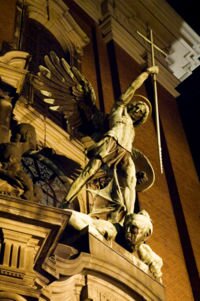In most languages of Christian societies, other than English, German and some Slavic languages, the holiday's name is derived from pecach the Hebrew name of Passover, a Jewish holiday to which the Christian Easter is intimately linked.
Easter depends on Passover not only for much of its symbolic meaning but also for its position in the calendar; the Last Supper shared by Jesus and his disciples before his crucifixion is generally thought of as a Passover seder, based on the chronology in the Synoptic Gospels. The Gospel of John has a different chronology which has the death of Jesus at the time of the slaughter of the Passover lambs, which may have been for theological reasons but which is regarded by some scholars as more historically likely given the surrounding events.
This would put the Last Supper slightly before Passover, on 14 Nisanof the Hebrew calendar. According to the Catholic Encyclopedia, "In fact, the Jewish feast was taken over into the Christian Easter celebration."
The English and German names, "Easter" and "Ostern", are not etymologically derived from Pesach and are instead related to ancient names for the month of April, Eostremonat and Ostaramanoth respectively. According to the 8th century Christian monk and historian Bede, this month was dedicated to the pagan fertility goddess Eostre. The Easter Bunny is often identified as a remnant of this fertility festival, although there is no evidence of any link.
More...







